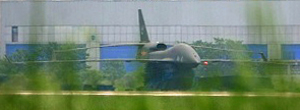Engineering:WZ-7
| WZ-7 Soaring Dragon | |
|---|---|

| |
| Earliest prototype of WZ-7 without the joined wing and v-shaped tail. | |
| Role | Unmanned maritime surveillance and patrol aircraft |
| National origin | People's Republic of China |
| Manufacturer | Guizhou Aircraft Industry Corporation |
| Designer | Chengdu Aircraft Industry Group |
| Introduction | 2018[1] |
| Status | In production[1] |
| Primary users | People's Liberation Army Air Force People's Liberation Army Navy |
| Produced | 2015/2016 - ?[2] |
| Number built | 16[2][3] |
The Guizhou WZ-7 Soaring Dragon (Chinese: 无侦-7 翔龙) is a high-altitude long endurance unmanned aerial vehicle (UAV) from the People's Republic of China.[1][4] The design uses a "unique" joined-wing design.[4]
The WZ-7 has a similar role and mission to the Northrop Grumman RQ-4 Global Hawk operated by the United States Air Force .[5] The primary mission is expected to be aerial reconnaissance, but it may also be fitted to provide targeting data for anti-ship ballistic missiles and cruise missiles.[5]
Development
The WZ-7 was designed by the Chengdu Aircraft Industry Group and constructed by the Guizhou Aircraft Industry Corporation. A model appeared at the 2006 China International Aviation & Aerospace Exhibition.[6] In 2011, it had not yet flown and radar cross-section and other electromagnetic tests were ongoing.[6] The UAV was officially unveiled at the 2021 exhibition.[4]
The WZ-7 entered serial production in 2015 to 2016.[2]
Design
Large by the standards of UAVs, the WZ-7's tandem, joined-wing design allows for a more rigid, less flexible wing than other configurations, with benefits said to include an increased lift-to-drag ratio and less complex flight controls than a HALE UAV with a conventional wing would require.[7][6][5] The aircraft is powered by a Guizhou WP-13 turbojet engine, a copy of the Soviet Tumansky R-13; it is anticipated that a newer, improved engine, will be installed in production aircraft.[6] The air intake for the engine is mounted atop the fuselage, with the engine itself mounted in the rear of the aircraft.[6]
Operational history
The WZ-7 entered service with the People's Liberation Army Air Force in 2018[1] and were spotted deployed to the Tibet Autonomous Region, Hainan Island and Yishuntun Airbase near North Korea.[8]
On 24 July 2019, a WZ-7 shadowed the American Ticonderoga-class cruiser USS Antietam which was transiting the Taiwan Strait.[9]
Operators
 People's Republic of China
People's Republic of China
- People's Liberation Army Air Force : 8 units[2]
- People's Liberation Army Naval Air Force : 8 units[3]
Specifications
Data from AirForces Monthly[6]
General characteristics
- Crew: None
- Length: 14.33 m (47 ft 0 in)
- Wingspan: 24.86 m (81 ft 7 in)
- Height: 5.41 m (17 ft 9 in)
- Powerplant: 1 × Guizhou WP-13 turbojet, 43.1 kN (9,700 lbf) thrust
Performance
- Cruise speed: 750 km/h (466 mph, 405 kn)
- Range: 7,000 km (4,300 mi, 3,800 nmi)
- Combat range: 2,000 km (1,200 mi, 1,100 nmi)
- Endurance: 10 hours
- Service ceiling: 18,000 m (59,000 ft)
- Thrust/weight: 5.8
See also
Aircraft of comparable role, configuration and era
Related lists
References
- ↑ 1.0 1.1 1.2 1.3 Rupprecht, Andreas; Dominguez, Gabriel (11 November 2021). "Chinese air force equips 16th Air Division with WZ-7 HALE UAVs". https://www.janes.com/defence-news/news-detail/chinese-air-force-equips-16th-air-division-with-wz-7-hale-uavs.
- ↑ 2.0 2.1 2.2 2.3 Rupprecht, Andreas. Modern Chinese Warplanes:Chinese Air Force - Aircraft and Units. Harpia Publishing. p. 106. ISBN 978-09973092-6-3.
- ↑ 3.0 3.1 Rupprecht, Andreas (2018). Modern Chinese Warplane: Chinese Naval Aviation - Aircraft and Units. Harpia Publishing. p. 36. ISBN 978-09973092-5-6.
- ↑ 4.0 4.1 4.2 Waldron, Greg (29 September 2021). "Zhuhai UAV bazaar returns with a vengeance". Gale General OneFile. https://link.gale.com/apps/doc/A677324928/ITOF?u=wikipedia&sid=ebsco&xid=b01222a3.
- ↑ 5.0 5.1 5.2 Newdick, Thomas, ed (September 2011). "World News: China's Soar Eagle UAV revealed". Combat Aircraft (Hersham, Surrey, UK: Ian Allan Publishing) 12 (9): 30. ISSN 2041-7489.
- ↑ 6.0 6.1 6.2 6.3 6.4 6.5 Parsons, Gary, ed (September 2011). "News Headlines: Has China Unveiled Its Soar Dragon?". AirForces Monthly (London: Key Publishing) (282): 4–5.
- ↑ Yeo, Mike (30 September 2021). "Chinese airshow offers glimpse at military's new drones". https://www.defensenews.com/unmanned/2021/09/30/chinese-airshow-offers-glimpse-at-militarys-new-drones/.
- ↑ "Soar Dragon UAVs Deploy to Yishuntun Airbase". Bellingcat. 23 March 2018. https://www.bellingcat.com/news/rest-of-world/2018/03/23/soar-dragon-uavs-deploy-yishuntun-airbase/.
- ↑ Axe, David (29 July 2019). "China's Giant Spy Drone Just Tailed a U.S. Navy Cruiser". https://nationalinterest.org/blog/buzz/china%E2%80%99s-giant-spy-drone-just-tailed-us-navy-cruiser-69881.


